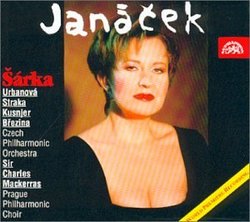Another real discovery of Janacek's first opera.
David A. Hollingsworth | Washington, DC USA | 05/28/2001
(5 out of 5 stars)
"In some ways Zdenek Fibich's Sarka (1896-1897) overshadows Janacek's opera of the same name. Written in 1887-1888, Janacek was more than proud of the work when he completed the piano score of it and in Alena Nemcova's well-written notes accompaning this CD, Janacek felt further encouraged after discussing the score with Antonin Dvorak. But Janacek ran into problems. The published text "Sarka, Musical Drama" was written by the poet Julius Zeyer and it was Zeyer who refused Janacek's request to set the text to music. After making further revisions and orchestrated the first two acts, Janacek put aside the score in his manuscript drawer, only to return to it in 1918. Once he returned to the score, he worked on it further and had his student, Osvald Chlubna complete the orchestration of Act III. At the end of 1918, the Czech Academy (to whom Zeyer had willed his rights) granted Janacek's request to use the text. Further revisions took place in 1924-1925 and the opera was performed posthumously, by 1938 in Olomouc, ten years after the composer's death. Based on the Czech mythology as in Fibich's, Sarka is a Bohemian female warrior in Vlasta's women army and a follower of Libuse (a title name in Smetana's opera). After the death of Libuse, her husband, Prince Premysl expelled Sarka and her female companions from the court. Although not in Janacek's opera, Vlasta leads a revolt carried out by Sarka (having the tenacity and the daringness of a Brunnhilde or a Therese for that matter). Ctirad leads a male counter-revolution and guards Libuse's tomp. As the women attempt to capture the tomb, Ctirad repelled them. However, Ctirad fell in love with Sarka and although the feeling was mutual, she had him murdered by her cohorts. Driven by guilt, Sarka immolates herself on his funeral pyre. The men versus women thing is certainly not "politically correct" for many. But, somehow I wish that Janacek had written a longer opera, for the story itself offers amble opportunities for theatrical presentations in huge scales and proportions as Fibich admirably proved: it could easily have been a grand opera in the vein of Gounod and Massenet. But Janacek was right to pursue the work despite the obstacles. His music is passionate, vivid, and heroic, absording much of Smetana as Fibich absorbed much of Wagner. But more importantly, for me at least, Janacek's Sarka have plenty of personal fingerprints to be found in his later works and his sense of dramatic impetus and musical incident is admirably established in his early endeavor.Sir Charles Mackerras, to me the leading expert of Janacek's works, draws a forceful yet lucid performances from the Czech Philharmonic Orchestra and the Prague Philharmonic Choir. The casting is superb. Eva Urbanova could never have been a more powerful, compelling, visionary, Sarka. She portrayed Sarka with great tenacity as Birgit Nilsson did with Brunnhilde or Huguette Tourangeau with Therese (Massenet). Peter Straka brings out the heroics of Ctirad admirably and likewise with force while Ivan Kusnjer as Premysl and Jaroslav Brezina as Lumir are convincing throughout.Before this recording, the first real discovery of Janacek's "flawed masterpiece" was the Multisonic mono (CD 310154-2) reissue of the 1953 recording featuring Brno Radio Symphony Orchestra and Chorus conducted by Bretislav Bakala (a best advocates of Janacek's music before Frantisek Jilek, Vaclav Neumann, and Mackerras). The casting is equally superb (Alena Novakova as Sarka is likewise thrilling) and the performance of the Brno Radio Symphony Orchestra and Chorus is compulsive in their own right. Therefore, I would hunt for the Multisonic mono CD re-issue along with the Mackerras' Supraphon. One final note, though. It seems that Supraphon is, as of late, running a practice of not including a synopsis and/or detailed scenic discriptions within the libretti. That's a disadvantage to a listener who wants a more rounded picture of the plots behind the operas, especially those of obsurity such as Sarka and the Bride of Messina (of Fibich). Hopefully, Supraphon will reverse that and give us a fuller presentation as it did in its 1995 re-issue of Janacek's "Fate." Nevertheless, a worthy acquisition along with the Multisonic mono reissue. Meanwhile, dare I hope for a revival of Janacek's Sarka in theatrical or in concert form?"
BETTER THAN FIBICH'S!
Alfredo R. Villanueva | New York, NY United States | 08/28/2008
(5 out of 5 stars)
"I HAVE JUST POINTED OUT IN MY REVIEW OF FIBICH'S SARKA, HOW JANACEK'S IS FAR SUPERIOR IN MODERNITY AND MUSICAL TIGHTNESS. OBVIOUSLY, OTHERS MAY NOT DO AGREE WITH ME. I DO OWN THE 1953 RECORDING--AND I AGREE WITH THE PREVIOUS REVIEWER THAT BOTH ARE EQUALLY MAGNIFICENT. HOWEVER, I MUST POINT OUT THAT MY COPY OF THIS RECORD CAME WITH AN OUTER BOX CONTAINING BOTH THE ACTUAL PLASTIC BOX WITH THE RECORDS AND A PAMPHLET CONTAINING THE LIBRETTO AND DETAILED NOTES! SO, IF YOU ONLY RECEIVE THE RECORD BY ITSELF, THE SET IS INCOMPLETE. SUPRAPHON IS NOT TO BLAME; THEY HAVE DONE THEIR USUAL SUPERB JOB OF PACKAGING."


 Track Listings (20) - Disc #1
Track Listings (20) - Disc #1